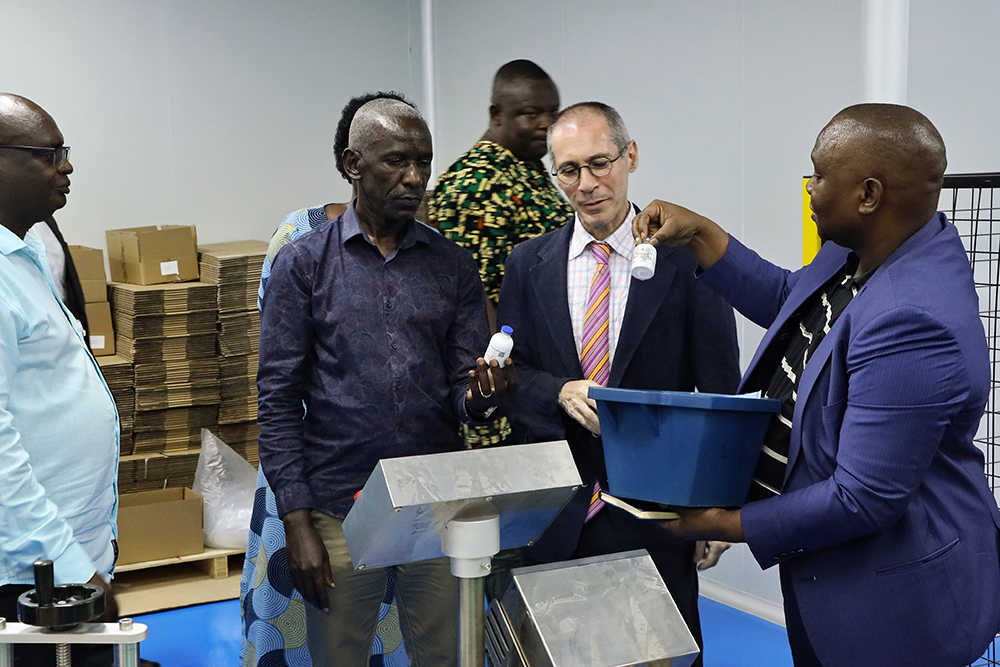Anti-tick vaccine to cost Ugandan farmers sh3,600
“The idea of African solutions to African problems is essential, and today, we have witnessed a solution relevant not only to Uganda but the entire continent,” Dulitzky said.
The World Bank Regional Director for Eastern and Southern Africa, Daniel Dulitzky, during a tour of the NARO anti-tick vaccine production facility at Nakyesasa in Wakiso district last week. (Courtesy photos)
________________
Livestock farmers, who have been spending a lot of money to purchase anti-tick vaccines, will now spend about shillings 3,600 per dose to treat one cow, a team of researchers who have been developing the anti-tick vaccine has said.
The team from the National Livestock Resources Research Institute (NaLRRI) based at Nakyesesa, was revealed to World Bank regional director for eastern and southern Africa Daniel Dulitzky.
He was on November 20, 2025, touring the premises of the vaccine facility guided by National Agricultural Research Organisation (NARO) director general Dr Yona Baguma, a team from the board and the agriculture ministry (MAAIF).
Speaking during a visit to the vaccine production facility, Dulitzky expressed admiration for the progress Uganda has made in developing homegrown agricultural solutions like the anti-tick vaccine.
“The idea of African solutions to African problems is essential, and today, we have witnessed a solution relevant not only to Uganda but the entire continent,” Dulitzky said.
He highlighted the economic impact of the Anti-Tick Vaccine, noting that Uganda loses $ 1.1 billion (over shillings 3.6 trillion) annually to tick-borne diseases.

But with the new facility, having a production capacity of 60 million doses a year, farmers will access the vaccine at $1 per dose (shillings 3,500). This means farmers will be saving $49 (shillings 170,000) per cow, off what they have been spending on the purchase of anti-tick vaccine doses.
“I am not Ugandan, but I feel proud anyway. On behalf of my team, we leave very impressed with what we have seen,” he added.
Baguma lauded the World Bank for its long-standing support that has enabled Uganda to establish multiple Centres of Excellence, including the Cassava Centre of Excellence.
“With the support of the World Bank, we have been able to build a strong foundation for high-impact agricultural research,” Baguma said.
He added that NARO has now emerged as a competitive entity and a strategic leader on the continent, delivering solutions that impact livelihoods beyond Uganda.
He shared NARO’s ambition to scale the current vaccine capacity into a fully-fledged regional hub for vaccines, pharmaceuticals, and biologicals.
“We want to expand capacity to benefit the entire continent and the world by developing human capital, strengthening infrastructure, and producing products that transform livestock and human health,” he added.
Baguma also revealed NARO’s plan to transform the Cassava Centre of Excellence into an integrated African cassava value chain, from production to industrial value addition, aimed at boosting food security, industry, and rural incomes.
Speaking on behalf of the NARO Governing Council, Kenneth Katungisa, who is also a cattle farmer, underscored the urgency of the anti-tick vaccine.
“The demand for this vaccine, even before mass production begins, is enormous,” he said.
He warned of desperate measures farmers have resorted to, including mixing acaricides with pesticides, resulting in blindness in half of some herds.
He noted that current acaricide spraying costs exceed $50 per week, yet the chemicals no longer work effectively.
Representing agriculture minister, commissioner Dr Paul Mwambu emphasised the heavy financial burden Uganda bears in importing vaccines and other disease-control inputs.
The anti-tick vaccine, he said, demonstrates that Uganda can produce its own solutions affordably and efficiently.
He expressed optimism that with continued investment and coordinated planning, the country can expand to producing additional vaccine lines.
Mwambu emphasised the need to strengthen research, extension, and innovation systems, while also calling for increased investment in irrigation, storage, and rural road infrastructure to unlock productivity.
The commissioner of extension services and skilling, Dr Henry Opolot Nakalet, who represented MAAIF permanent secretary, underscored the importance of adopting a value chain approach in implementing agricultural projects.
He observed that Uganda’s agricultural interventions have often suffered when investments are made in isolated segments, such as focusing solely on production, while ignoring critical components like processing, market development, storage, extension, and financing.